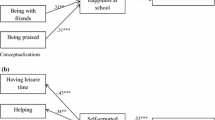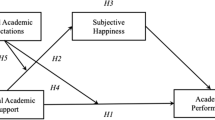Abstract
This study aimed to examine the role of positive relationships and academic achievement in predicting student well-being, i.e. subjective happiness. This study employed a longitudinal design with two waves of data collection on a sample of 786 primary school students in Hong Kong. Students completed questionnaires on parent-child relationship, teacher-student relationship, peer relationship, academic achievement, and happiness at the beginning and end of the school year. Path analysis was used for data analysis. The results indicated that Time 1 parent-child relationship and peer relationship were associated with Time 2 academic achievement, after controlling for Time 1 academic achievement. However, only Time 1 parent-child relationship was predictive of Time 2 happiness. Time 2 academic achievement was a mediator between Time 1 parent-child relationship and peer relationship and Time 2 happiness. Furthermore, girls reported higher levels of academic achievement when they perceived better peer relationship than did boys, and girls were happier when they had higher levels of academic achievement than were boys. The results suggested the need to put in place strategies to enhance parent-child relationship, peer relationship, and a harmonious classroom.

Similar content being viewed by others
References
Acock, A. (2005). Working with missing values. Journal of Marriage and Family, 67, 1012–1028.
Ainley, J., Goldman, J., & Reed, R. (1990). Primary schooling in Victoria: A study of students' attitude and achievements in years 5 and 6 of government primary schools. ACER monograph no.37. Hawthorn: Australian Council for Education Research.
Arbuckle, J. (2012). IBM SPSS AMOS (version 21.0)[computer program]. Chicago: IBM.
Baumeister, R. F., & Leary, M. R. (1995). The need to belong: Desire for interpersonal attachments as a fundamental human motivation. Psychological Bulletin, 117, 497–529.
Bronfenbrenner, U. (1979). The ecology of human development. Cambridge: Harvard University Press.
Browne, M. W., & Cudeck, R. (1993). Alternative ways of assessing model fit. Sage Focus Editions, 154, 136–136.
Census and Statistics Department. (2019). Population and Household Statistics Analysed by District Coundil District. Retrieved from https://www.statistics.gov.hk/pub/B11303012018AN18B0100.pdf. Accessed 16 Oct 2020.
Choi, A. W. K. (2012). The relationship between family cohesion and intimacy in dating relationship: A study based on attachment and exchange theories. Discovery – SS Student E-Journal, 1, 91–109.
Deci, E. L., & Ryan, R. M. (2000). The “what” and “why” of goal pursuits: Human needs and the self-determination of behavior. Psychological Inquiry, 11, 227–268.
Diener, E. (2006). Guidelines for national indicators of subjective well-being and ill-being. Journal of Happiness Studies, 7, 397–404.
Education Bureau. (2013). Assessment Program for Affective and Social Outcomes, 2nd version. Retrieved from https://www.edb.gov.hk/en/sch-admin/sch-quality-assurance/performance-indicators/apaso2/index.html
Holder, M. D., & Coleman, B. (2009). The contribution of social relationships to children’s happiness. Journal of Happiness Studies, 10, 329–349.
Hu, L. T., & Bentler, P. M. (1999). Cutoff criteria for fit indexes in covariance structure analysis: Conventional criteria versus new alternatives. Structural Equation Modeling, 6(1), 1–55.
Knifsend, C. A., Camacho-Thompson, D. E., Juvonen, J., & Graham, S. (2018). Friends in activities, school-related affect, and academic outcomes in diverse middle schools. Journal of Youth and Adolescence, 47, 1208–1220.
Koepke, M. F., & Harkins, D. A. (2008). Conflict in the classroom: Gender differences in the teacher–child relationship. Early Education and Development, 19, 843–864. https://doi.org/10.1080/10409280802516108.
Lai, M. K., Leung, C., Kwok, S. Y. C., Hui, A. N. N., Lo, H. H. M., Leung, J. T. Y., & Tam, C. H. L. (2018). A multidimensional PERMA-H positive education model, general satisfaction of school life, and character strengths use in Hong Kong senior primary school students: Confirmatory factor analysis and path analysis using the APASO-II. Frontiers in Psychology, 9, 1090. https://doi.org/10.3389/fpsyg.2018.01090.
Lam, B. H., & Phillipson, S. (2009). What are the affective and social outcomes for low-achieving students within an inclusive school in Hong Kong? Educational Research for Policy and Practice, 8, 135–150.
Lim, S. A., You, S., & Ha, D. (2015). Parental emotional support and adolescent happiness: Mediating roles of self-esteem and emotional intelligence. Applied Research in Quality of Life, 10(4), 631–646.
López Turley, R. N., Desmond, M., & Bruch, S. K. (2010). Unanticipated educational consequences of a positive parent-child relationship. Journal of Marriage and Family, 72, 1377–1390.
Lopez-Perez, B., & Fernandez-Castilla, B. (2018). Children’s and adolescents’ conceptions of happiness at school and its relation with their own happiness and their academic performance. Journal of Happiness Studies, 19, 1811–1830.
Lyubomirsky, S., & Lepper, H. S. (1999). A measure of subjective happiness: Preliminary reliability and construct validation. Social Indicators Research, 46, 137–115.
Lyubomirsky, S., Sheldon, K. M., & Schkade, D. (2005). Pursuing happiness: The architecture of sustainable change. Review of General Psychology, 9, 111–131.
Ma, C. M. S., Shek, D. T. L., & Chen, J. M. T. (2019). Changes in the participants in a community-based positive youth development program in Hong Kong: Objective outcome evaluation using a one-group pretest-posttest design. Applied Research in Quality of Life, 14(4), 961–979.
Marsh, H. W., Smith, I. D., & Barnes, J. (1983). Multitrait-multimethod analysis of the self-description questionnaire: Student-teacher agreement on multidimensional ratings of student self-concept. American Educational Research Journal, 20, 333–357.
Martin, A. J., Marsh, H. W., McInerney, D. M., Green, J., & Dowson, M. (2007). Getting along with teachers and parents: The yields of good relationships for students’ achievement motivation and self-esteem. Australian Journal of Guidance and Counselling, 17(2), 109–125.
Medvedev, O. N., & Landhuis, E. C. (2018). Exploring constructs of well-being, happiness and quality of life. PeerJ, 6, e4903. https://doi.org/10.7717/peerj.4903.
Mikami, A. Y., Ruzek, E. A., Hafen, C. A., Gregory, A., & Allen, J. P. (2017). Perceptions of relatedness with classroom peers promote adolescents’ behavior engagement and achievement in secondary school. Journal of Youth and Adolescence, 46, 2341–2354.
Nan, H., Ni, M. Y., Lee, P. H., Tam, W. W. S., Lam, T. H., Leung, G. M., & McDowell, I. (2014). Psychometric evaluation of the Chinese version of the subjective happiness scale: Evidence from the Hong Kong FAMILY cohort. International Journal of Behavioral Medicine, 21, 646–652.
Pang, N. S. K. (1999). Students' perceptions of quality of school life in Hong Kong primary schools. Educational Research Journal, 14(1), 49–71.
Peltzer, K. (2007). Predictors of positive health among a sample of south African adolescents. Psychological Reports, 100, 1186–1188.
Qi, S., Hua, F., Zhou, Z., & Shek, D. (2020). Trends of positive youth development publications (1995–2020): A scientometric review. Applied Research in Quality of Life. https://doi.org/10.1007/s11482-020-09878-3.
Roorda, D. L., Koomen, H. M. Y., Spilt, J. L., & Oort, F. J. (2011). The influence of affective teacher student relationships on students’ school engagement and achievement: A meta-analytic approach. Review of Educational Research, 81, 493–529.
Rose, A. J., & Rudolph, K. D. (2006). A review of sex differences in peer relationship processes: Potential trade-offs for the emotional and behavioral development of girls and boys. Psychological Bulletin, 132, 98–131.
Rubin, D. B. (1996). Multiple imputation after 18+ years. Journal of the American Statistical Association, 91, 473–489.
Rucinski, C. L., Brown, J. L., & Downer, J. T. (2018). Teacher-child relationships: Classroom climates and children’s social-emotional and academic development. Journal of Educational Psychology, 110, 992–1004.
Schafer, J. L., & Olsen, M. K. (1998). Multiple imputation for multivariate missing data problems: A data analyst’s perspective. Multivariate Behavioral Research, 33, 545–571.
Shek, D. T. L., & Chai, W. (2020). The impact of positive youth development attributes and life satisfaction on academic well-being: A longitudinal mediation study. Frontiers in Psychology, 11, 2126. https://doi.org/10.3389/fpsyg.2020.02126.
Shek, D. T., & Ma, C. M. (2012). Impact of the project P.A.T.H.S. in the junior secondary school years: Objective outcome evaluation based on eight waves of longitudinal data. Scientific World Journal, 2012, 170345. https://doi.org/10.1100/2012/170345.
Shek, D., & Siu, A. M. (2019). "UNHAPPY" environment for adolescent development in Hong Kong. The Journal of Adolescent Health, 64(6S), S1–S4.
Shek, D. T., & Yu, L. (2012). Longitudinal impact of the project PATHS on adolescent risk behavior: What happened after five years? Scientific World Journal, 2012, 316029. https://doi.org/10.1100/2012/316029.
Shek, D. T. L., & Zhu, Z. Q. (2020). Promotion of thriving among Hong Kong Chinese adolescents: Evidence from eight-wave data. Research on Social Work Practice, 30(8), 870–883.
Shek, D. T. L., Dou, D., Zhu, X., & Chai, W. Y. (2019). Positive youth development: Current perspectives. Adolescent Health, Medicine and Therapeutics, 10, 131–141.
Shek, D. T., Lin, L., Ma, C. M., Yu, L., Leung, J. T. Y., Wu, F. K. Y., et al. (2020). Perceptions of adolescents, teachers and parents of life skills education and life skills in high school students in Hong Kong. Applied Research in Quality of Life. https://doi.org/10.1007/s11482-020-09848-9.
Sroufe, L. A., & Rutter, M. (1984). The domain of developmental psychopathology. Child Development, 55, 17–29.
State, T. M., & Kern, L. (2017). Life satisfaction among high school students with social, emotional and behavioral problems. Journal of Positive Behavior Interventions, 19(4), 205–215.
Suldo, S. M., Riley, K. N., & Shaffer, E. J. (2006). Academic correlates of children and adolescents’ life satisfaction. School Psychology International, 27, 567–582.
Tam, H. L., Kwok, S. Y. C., Ling, C. C. Y., & Li, C. I. K. (2018). The moderating effects of positive psychological strengths on the relationship between tiger parenting and child anxiety. Children and Youth Services Review, 94, 207–215.
Terrett, G., O’Connor, M., Hawkins, M. T., Sanson, A., & Smart, D. (2012). Longitudinal antecedents of school bonding in adolescents. The Australian Educational and Developmental Psychologist, 29(2), 107–128.
Tian, L., Zhang, L., Huebner, E. S., Zheng, X., & Liu, W. (2016). The longitudinal relationship between school belonging and subjective well-being in school among elementary school students. Applied Research in Quality of Life, 11(4), 1269–1285.
Tkach, C., & Lyubomirsky, S. (2006). How do people pursue happiness? Relating personality, happiness-increasing strategies and subjective well-being. Journal of Happiness Studies, 7, 183–225.
Veenhoven, R. (2012). Happiness: Also known as ‘life-satisfaction’ and ‘subjective well-being’. In K. C. Land, A. C. Michalos, & M. J. Sirgy (Eds.), Handbook of Social Indicators and Quality of Life Research (pp. 63–77). Dordrecht: Springer Publishers. https://doi.org/10.1007/978-94-007-2421-1_3.
Wang, M., Deng, X., & Du, X. (2018). Harsh parenting and academic achievement in Chinese adolescents: Potential mediating roles of effortful control and classroom engagement. Journal of School Psychology, 67, 16–30.
Wong, M. Y. (2016). Teacher–student power relations as a reflection of multileveled intertwined interactions. British Journal of Sociology of Education, 37(2), 248–267. https://doi.org/10.1080/01425692.2014.916600.
Worthen, M. G. F. (2011). Gender differences in parent–child bonding: Implications for understanding the gender gap in delinquency. Journal of Crime and Justice, 34, 3–23. https://doi.org/10.1080/0735648X.2011.554744.
Wu, C. Y., & Lee, T. S. H. (2020). Impact of parent–child relationship and sex on trajectories of children internalizing symptoms. Journal of Affective Disorders, 260, 167–173.
Yuan, S., Weiser, D. A., & Fischer, J. L. (2016). Self-efficacy, parent-child relationships and academic performance: A comparison of European American and Asian American college students. Social Psychology of Education, 19, 261–280.
Zhu, X., & Shek, D. T. L. (2020). Impact of a positive youth development program on junior high school students in mainland China: A pioneer study. Children and Youth Services Review, 114, 105022.
Funding
The project was financed by Bei Shan Tang Foundation.
Author information
Authors and Affiliations
Corresponding author
Additional information
Publisher’s Note
Springer Nature remains neutral with regard to jurisdictional claims in published maps and institutional affiliations.
Rights and permissions
About this article
Cite this article
Leung, C., Leung, J.T.Y., Kwok, S.Y.C.L. et al. Predictors to Happiness in Primary Students: Positive Relationships or Academic Achievement. Applied Research Quality Life 16, 2335–2349 (2021). https://doi.org/10.1007/s11482-021-09928-4
Published:
Issue Date:
DOI: https://doi.org/10.1007/s11482-021-09928-4




